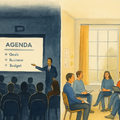 „...To a very limited degree, industry has experimented with such [person-centered] communities quite successfully – until a point is reached where the goal of personal growth confronts the goal of profit-making...” – Carl R. Rogers on Personal Power, 1977
„...To a very limited degree, industry has experimented with such [person-centered] communities quite successfully – until a point is reached where the goal of personal growth confronts the goal of profit-making...” – Carl R. Rogers on Personal Power, 1977„Happy families are all alike; every unhappy family is unhappy in its own way.” – Lev Tolstoi
If you substitute „company” for „family” and „successful” for „happy” in the Lev Tolstoi’s very well-known quote, we are where I lots of times find myself when reading about management. We are always up-beat, everything is fine or it is almost fine already, „there is only a tiny part missing”. Of course, we should most of the time target/picture the goal to be able to build on it but sometimes it might also help to see the reality, „to confront the brutal facts” (Jim Collins) we are sometimes in.
Normal is that a business coach is assisting the client to move towards more authenticity, more self-awareness, more capacity/capability for his decision making and at the same time towards more security. Or otherwise formulated: towards a dynamic and reassuring simplicity and authenticity in life.
Life though sometimes offers situations where there are inherent insecurity in the decision making and in the way we are just operating which are very difficult to solve. It’s rather rare but it happens and sometimes, perhaps, it’s worth to speak about it a bit.
I want to speak here about two - a little bit overlapping – such dilemmas related to the corporate culture what in certain situation are somehow next to impossible to solve:
1. First, let’s look at the dilemma of the real individual freedom and the corporate goals. It’s normal that everybody (on the first place the owner, the management) will do everything for aligning the two and in the vast majority of the cases the way to this alignment will be found. Though – and the quote of Mr. Rogers makes allusion on such situations – sometimes the individual should (provided he wants to remain part of the organization) submit himself, his goals, sometimes his risk-awareness to a higher corporate will.
2. The dilemma of democracy and corporate order. I’m strongly convinced that in our best inner part the democracy in the broadest sense is our best friend. It is the environment in which everybody can live the fairness of the world, that of the society and that of the group.
Let’s see first the political aspect as a metaphor which is more familiar to us. It’s not easy to define democracy, I propose here the definition of the Oxford Dictionary: „control of an organization or group by the majority of its members”. We see – especially now when the world is a little bit in trouble here and there – how difficult, slow and weak to operate the political democracy, especially related to the real good, long-range decision-making (as Churchill well said: „...democracy is the worst form of government except all those other forms that have been tried from time to time”).
By the same token let’s regard now the smaller scale organizations in which we are spending most of our time. These organisations are operating rather well and oiled (one can say that much better than the governments of countries). As for their operating mode, they are operating under relatively limited democracy. Here, the control is much more clear and continuous. There are e.g. no in-built 4-year turnover and election on who will be ruling a country for the next period; the decisions are made with a big autonomy of the owner/leader of the organization and the majority of their members are relatively deprived of the right to participate in the decision-making.
The often cited (and very much respected by me too) medicine of „empowerment” is a really difficult one. If you have the courage to empower a staff being not enoughly committed and aligned, the company could get into great trouble. The so empowered people will pull the company in any type of directions and you will see the result. Of course, at the best companies you will find aligned, committed and empowered staff, it’s for them bread and butter but to reach this level, well... that’s what I have called „difficult”...with a slight understatement...
In a „normal” enterprise, this special deprivation (the relatively low level or lack of empowerment) is then found most of the time natural and it stirres relatively low level of frustration (it’s true also that these „normal” companies are always operating under their optimal performance). There are two other areas where the „democracy” has a question mark after it... As a joke (after a German stand-up, by the way), you can even say that „c’mon, where could we find structures in our life which are operating without any flaw? The family, the school and the company, aren’t they? Have you got any real democracy in these structures? No? Can you follow me?!”). Of course, when the system is abused in these instances – and it happens sometimes – the situation became unbearable and something will happen to restore the balance. But, if the system works well, the „democracy” is not very much missing in these particular cases.
Please, really, once more, don’t come now to me with the motivation, empowerment, etc. Of course, without a certain dose of these charachteristics (the more the better) you cannot reach (any of the mentioned organization won’t be able to reach) the goals set. Of course, the leader (or management group), the head of family (father or mother, depends on the given family and even on the given issue at stake...), the instructor, the teacher, the professor, the coach must do everything that the common efforts towards the common goals be motivated, committed, aligned, harmonious and joyful. But, when the decisions are made, whatever long the democratic discussion around the alternatives will be, this decision must be a responsible and integrated one of an individual (or a small group of individuals). Responsibility, stupid!
You know, one of my favorite book of management is „The starfish and the spider”. It’s all about the beauty of empowerment. There is, however, a small flaw here. In the first part of the book the „ideal” structure is that of iMule, a file-sharing widget (sorry) which is able at the end of the day fight the big labels. Fine. The only problem is that iMule (as far as I know from the book) has no HQ, no CEO, no business model, no profit. Even this book says that a „normal” company will most probably a hybrid combo company searching for its sweet spot between complete decentralization (e.g. iMule) and complete centralization (e.g. the big music labels).






